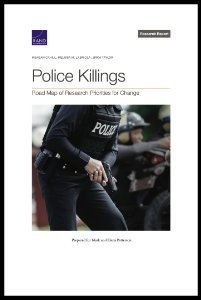Prepared for Mark and Elena Patterson. In memoriam Luke Patterson
.This report summarizes what is currently known about killings committed by police officers in the United States and identifies existing evidence about various ways to prevent them. A relatively large body of research on these topics exists, but these studies often suffer from methodological shortcomings, largely stemming from the dearth of available data on police killings. Recognizing the need for more-rigorous work to guide efforts to reform police—and, more specifically, to reduce police killings—this report presents work focused on the development of a research agenda, or a road map, to reduce police killings. The report, based on an extensive literature review as well as interviews with policing experts, presents a series of recommendations for areas in which research efforts may be most effective in helping inform policymaking and decisionmaking aimed at reducing police killings.
Police are one of the only institutions in the United States allowed to use force to coerce civilian compliance with laws and government decisions. In some cases, force—even fatal force—is needed to maintain the safety of the general public. But too often, excessive force is used against civilians, and this is the target of current police reform efforts in the United States. Sustained attention to and momentum toward reducing police killings had been lacking until May 2020, when the highly publicized murder of George Floyd was committed. Contributing to the current national conversation, this report summarizes what is currently known about killings committed by police in the United States and identifies existing evidence about various ways to prevent them.
RAND 2022. 80p.







